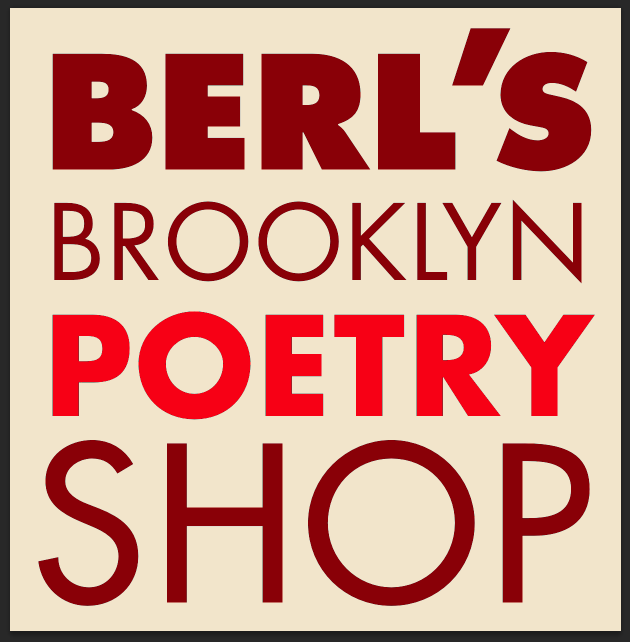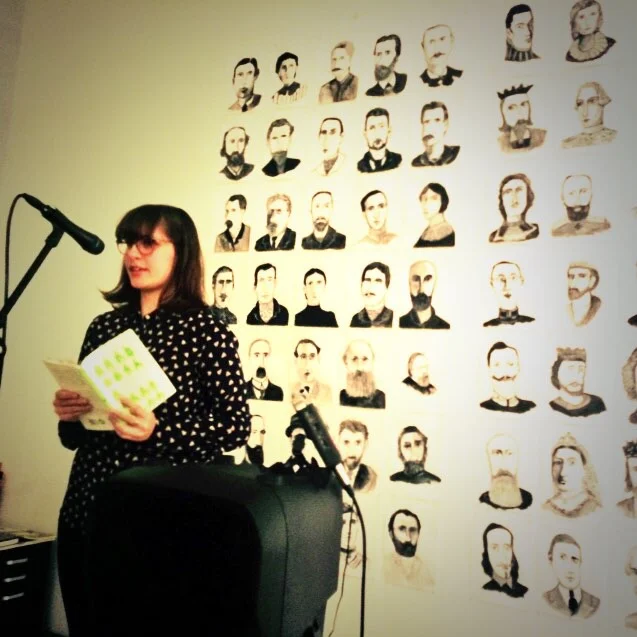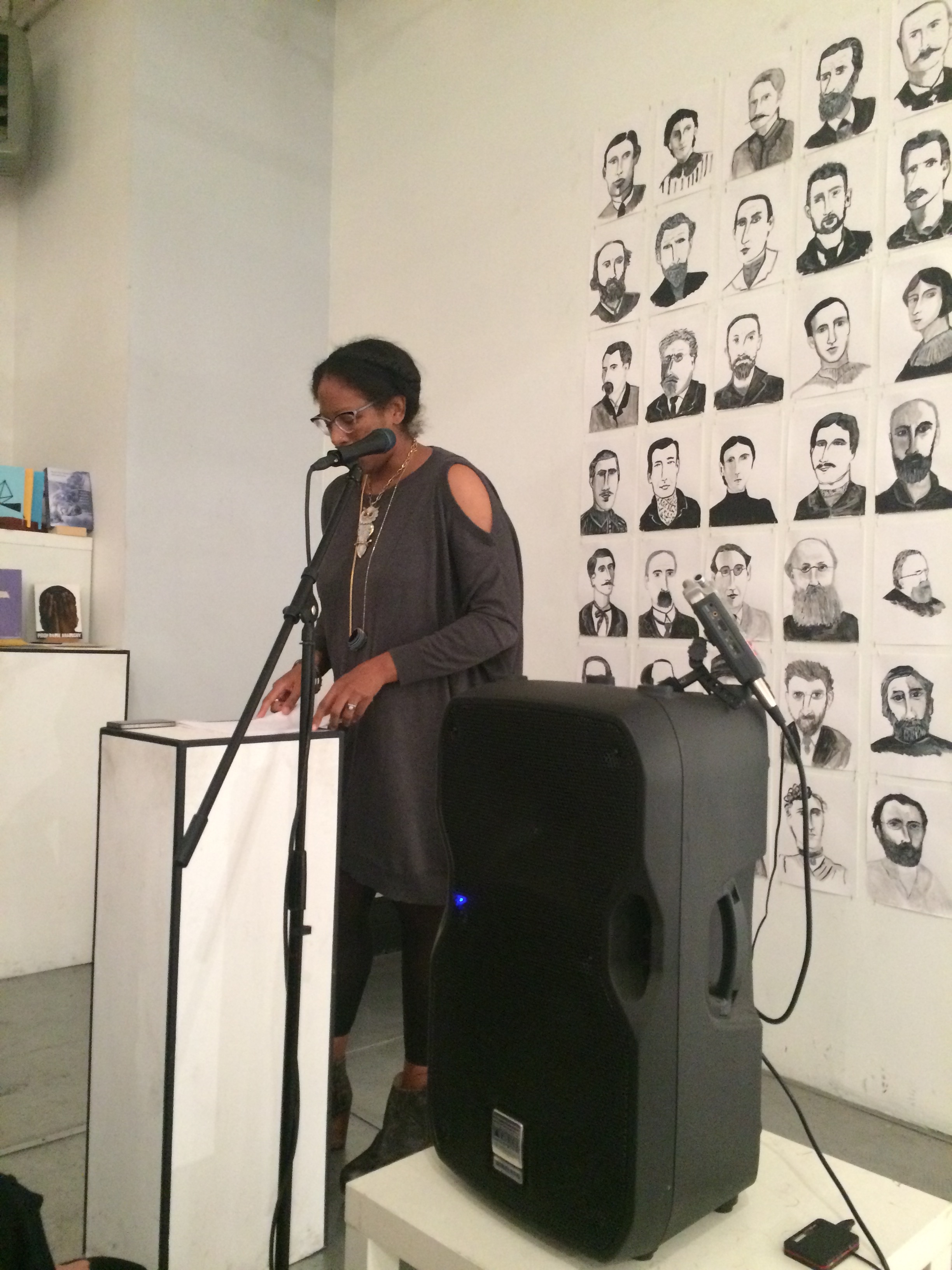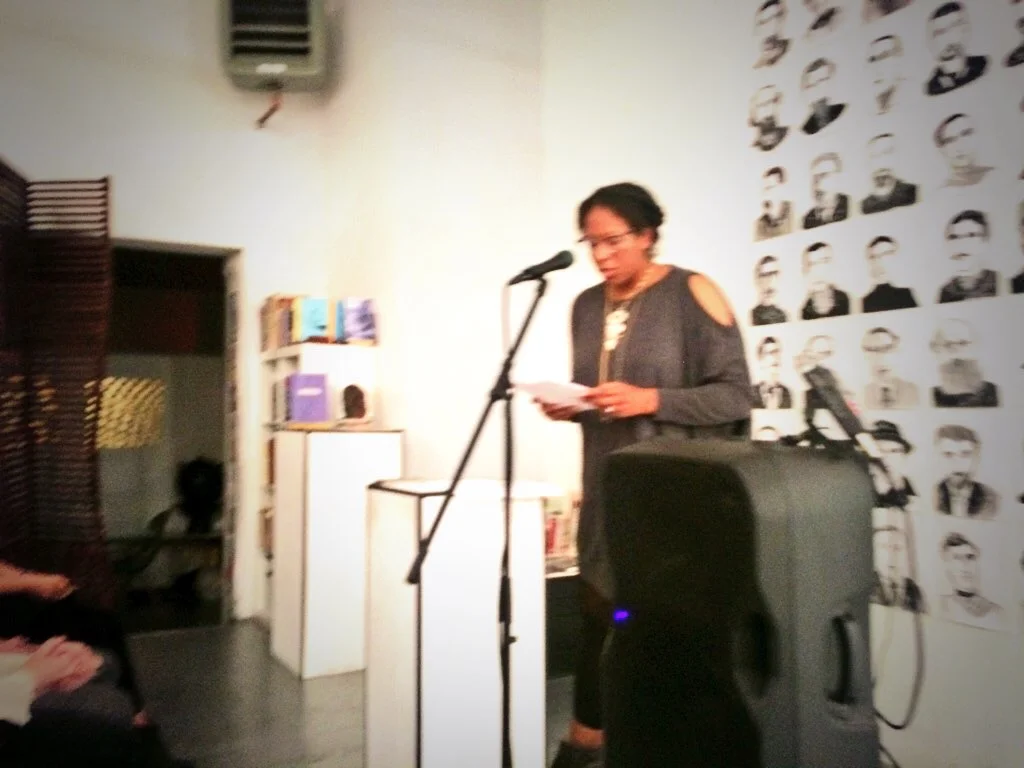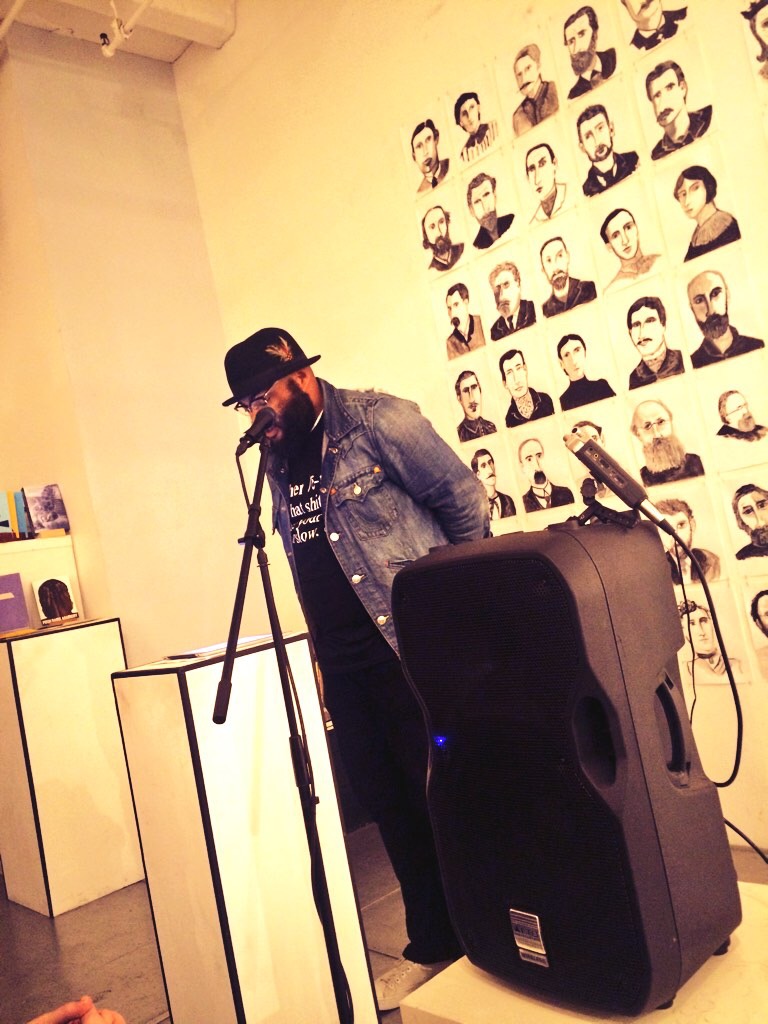A Reading with Claire Caldwell, Betsy Andrews, erica lewis, and A.H. Jerriod Avant
Here are our introductory notes for the reading, written by Jared, Farrah, and Berl's assistant Samantha Maldonado. The first minutes of Jared's introduction were not recorded on the audio, which begins as Claire takes the stage.
Begin with (first lines of erica lewis's chapbook Excerps from CAMERA OBSCURA:
“a photograph I saw made me think about time and the constant mutability of everything is actually the underlying story of all the stories we write”
and JERRIOD:
Our nights come gifting us with burning stars,
sifted by the contours this language carves
tonight we are hearing poets working on a poetry whose awareness could be said to be not only ecological but Topological. These are poets engaged with the "contours" of language – an environmental syntax, a use of language that could be described as four-dimensional, possessing a sense of space-time that is tactile: elastic, viscous, pulsing with energy.
examples:
Betsy Andrews. SCINTILLATING NOWNESS
“The past and the future are palindrome, think the mermaids, this present is an incessant interruption
Dan Thomas Glass on Erica Lewis “a language that could make the present persist beyond the nanomoments we exist within”
Claire Caldwell “orange time”
--
Generosity of poets with firewalls up between poetry and their very demanding day jobs (besty – editor of Saveur, Claire, editor of romance novels for Harlequin, Erica as a theater PR person, Jerriod Writer in the Public Schools Fellow and a photographer). Poetry as moonlighting but also as a rare opportunity for access. Leaving a rare window open
Claire: writing with an interest in different kinds of scales of time:
“whale falls dilapidate forty to sixty kilograms per day during the mobile scavenger phase. A human child may be conceived, born and walking before the skeleton is picked clean.
In Claire’s poetry land is as familial as people
Poetry that drips with nature, that can’t move forward without an aspect of nature,
“a house with snakes in its walls. Nightly rustlings, flickers of milk-green in the pantry
pressurized, Hothouse vibe
“In the museum even portraits seemed warm-blooded”
“The city swelled like an oyster when it rained”
Poetry of honesty, colorful, compact, quiet yet demanding “I arrive like a drug”
An interview with papirmasse describes her new book as juxtaposing the calamities of climate change and the dangers of the natural world with the intimacies of daily life.
fascinated by the lines we draw, individually and globally, between ourselves and the natural world
My hope is that poetry can connect people with the magic and mystery of their environments in ways other media can’t.
Betsy
I get the feeling of the apocalypse in Betsy’s work but it’s apocalypse rendered as vibrant and magnificent tapestry so when we might feel like we are going under, the energy of the poetry keeps us aloft.
There’s this sense of immanence, of about to happen, and of having happened just an instant ago, like the cartoon coyote going off a cliff and still hovering in midair.
The sun is coming up, I am turning you over I am going to be able to see your face
churning sentences that can mimic the flow of traffic or the swell of waves – betsy’s sentences unfurl over a landscape as if endlessly. I was showing my intro notes to Farrah and she said the quotes are so long but in betsy’s case especially it’s difficult not to quote her at length
FROM NEW JERSEY
"a bus full of party delegates slouching in their friction-charged skins/ rolls past the jobbing line, rolls past the meat-packing plant/ toward the birth of a new convulsive nature, a countrywide husbandry,/ an emotional swing, the dream of the dream of the dream of a driver,/ seated and commandeering down the gaping streets of retractable housing/ where the aluminum siding licks its own wounds,/ and a four-year-old in the driveway/ repeats to herself, you're okay, you're okay"/
THE BOTTOM
she’s been here before the back beyond, this spider crab, this scavenger, bandida of the nets before the gluing and the ungluing of the wild, wild west before the butcher, baker, and candlestick maker washed up in their jalopy, and disembarked their sloppy ark of pigs and sheep and donkeys, who, having nothing more to eat, ate the island head to feet and burped a pile of gristle— the monkey flower, bedstraw, lace pod, paintbrush swapped for European thistle;
the energy of her line is just so impactful and I get the sense even she is just riding a wave- I was struck by the way she introduces her prose poem “notes from the underground” in the journal NARRATIVITY. As a poet, I'm so intensely enamored of craft that the line can become my taskmaster… the messy horde of them resisted the line's enclosure The mob had a mind of its own… it was a choice that made itself.
Farrah was looking at her work and remarked this afternoon Betsy Andrews is a wizard of repetition
“the narwhal the sea cow the sea mink the monk seal a mouthful of ghost word, extinct”
playful with nature, nature as words, nature disappearing before our eyes, ghosting away while we watch, like the turn and churn of syllables that mutates one word into another. (Mink monk mouth…)
it’s easy to keep going while the environmental disasters pile up and nothing’s done about them, as though the more it worsens & the more outrage there is the more hopeless it becomes.
Betsy's writing though is not confined but fierce and uncompromising and expansive “our collective shrug as lethal as a blast pressure wound evidence forgotten as soon as it’s archived”
in this meth lab we know as air
Maybe it’s a bit on the nose but it could be said that Betsy is writing poetry that goes to the depths, to the furthest possible reach.
erica lewis is a poet of memory but it is a peculiar kind of memory that doesn’t seem restricted to the past. She writes “The great hot emptiness ahead what you keep calling memory” and “you are your own ghost” or – there’s a sense of some time-skipping perspective, like attending one’s own funeral or finding one’s own image blurred onto antique photographs. The poems often begin with a line of dashes suggesting tuning into a voice already speaking
Her sentences lope back on themselves like little déjà vu dissociations or premonitions or spells:
“to shrug off the urgency we wean ourselves from ourselves”
or
“In my head I am the passenger teller of tall tales everything on the edge of everything
or
“one is one’s own misrecognition / read as an epigraph
“you drive all night to find yourself standing in the road”
“I will hold my own hand”
“I’m bleeding on my own body”
In an interview with ArtAnimal Erica talked about her bk began in a period when she’d quit her job and felt her sense of self in some way stripped down, asking a question “How do you survive when you’ve already disappeared?”
Samuel beckett-y feeling of somehow like gathering this tiny silent particle of void and cloning it to produce a vast text, a hot-air blast of pure sensation, a disembodied voice in a darkness, the warmth inside someone's head.
Samantha Maldonado said murmur (from the title of her book Murmur in the Inventory) was so apt, that her writing feels unique in its volume, like hearing someone whispering right in your ear, tense and graceful and insistent.
In an interview she said, “A lot of my work has to deal with memory and the past, and how we grapple with the things we cannot change in order to move forward. Maybe I’m just trying to work out some unresolved issues that I have with growing up and being an adult. But I think it’s good to put all that out there; maybe others will get something out of it.”
Erica “we live in a place of corridors” and Jerriod is certainly also interested in hallways as access points to memory.
Jerriod
A friend and supporter of Berl's, his kind words on Brooklyn Poets.
From Longtown MS (between Oxford and Memphis)
In an interviews Jerriod talked about how childhood is inflected with “the traditions and social formations of southern Baptist church discourse
And then how he found a familiar “cultural aesthetics” here in Bed Stuy Brooklyn that resonated with his childhood in Mississippi and elsewhere. What especially strikes me about the work of his poetry is how it engages with questions of cultural aesthetics not only in the content (we certainly get a lush sense in his work of honeysuckle and johnsongrass) but the syntax, the way it plays luxuriantly with pace and tempo.
Jerriod is also a photographer andI was looking at his photographs which were featured in Columbia in which he achieves a unusual, narrow depth of field so there will be a thin layer in extreme almost precariously crisp focus – figures on a street corner for instance - surrounded both in front and behind by a shimmering blur of urban landscape. They are mostly city shots but critic Patrick James Errington aptly likens them to still lifes.
I see a similar kind of intensity in Jerriod’s poetry, which has a intriguing mixture of slowness and intensity. He will write these very long and languid sentences that meander in a sinuous way through clause after clause while describing an activity that is full of energy and directness so there’s this tension between the controlled syntax and the wildness of what is being described.
For instance from his poem “Stealing Seconds"
we wanted what we did. the hang time, the air, the freedom, an opportunity to alter the landscape’s composition
sugar melting in our arteries, leaving this earth on wheels and adrenaline,
I see him playing with tempo in the way he deploys words to create waves and eddies that make his poem nonlinear and pulsating. He writes:
she was long just like the word drawn-out
and another example:
planted engraved swirlings curved permanent at the end of me
There’s an awareness of space-time in his poems, time inflected by where it is passing, space rendered by time in unstable ways, such as memory.
his poems are interested in time and its own swirling. From a poem that recently appeared in Calaloo entitled UNUSUAL TIGHTROPE
I often ask what is it about hallways that makes them seem smaller after time. My friends say, it’s the
fact that your ass has grown up and because you’re bigger, the hallways get smaller. But I know that hallways don’t physically
shrink the same way that grapes give up their smooth skin while drying in the sun.
In a recent interview about this poem, Jerriod said he wanted “to capture on page what going home now felt. I wanted to recreate that space, its slowness
I’m intrigued by this idea of space has itself having a slowness, and I think Jerriod’s poems flesh out both this idea and also the sense of shifting tempos that exist in language.
